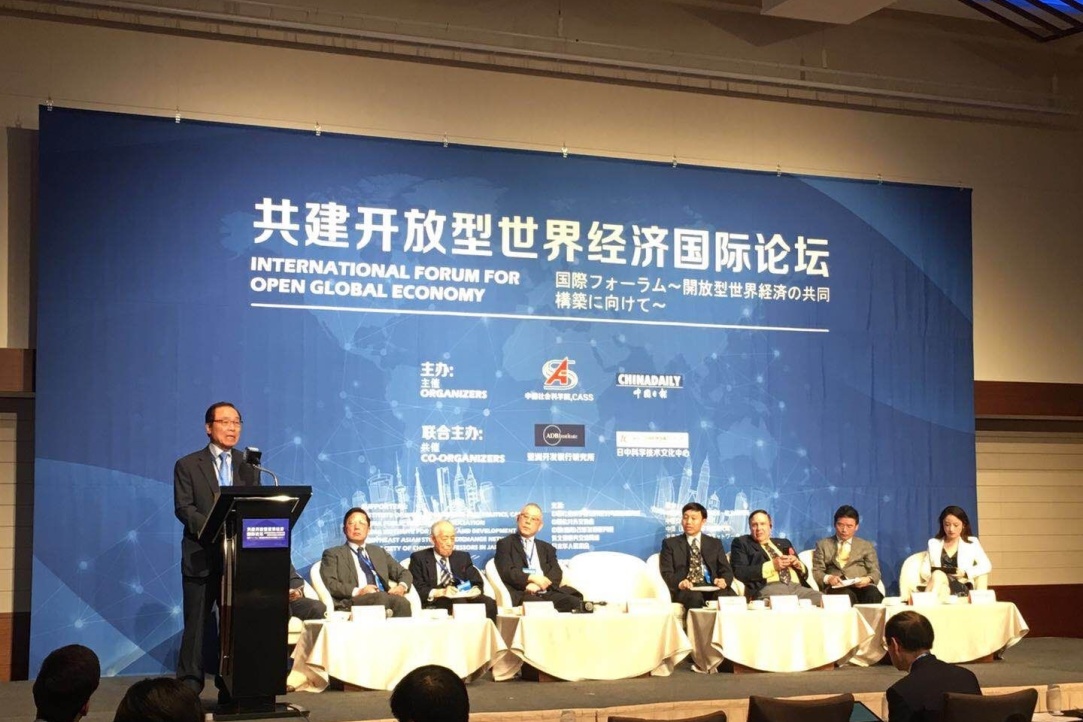
HSE University launches a regular online event devoted to various topics of economic policy. The meetings will be led by international scholars, prominent practitioners, or experts in current economic policy trends.
HSE University has an established reputation as a leading platform for academic and expert discussion in Russia and neighbouring countries. With this series, we aim to broadcast discussions on personal reflections of economic policy, theoretical approaches and practical outcomes of the last 20 years. We invite HSE students and those from other universities, scholars and experts from FSU and BRICS countries, independent think tanks, and representatives of the public sector interested in taking a systematic, in-depth look at the obstacles and limitations in the practical implementation of theoretical concepts of economic policy.
The focus of discussions:
Each discussion will be held online in English, with simultaneous translation into Russian for non-English speakers. Each discussion will be recorded for the HSE University website for further outreach.
Subscribe here to receive future events invitations




Fourth Meeting of the Discussion Club
National Research University Higher School of Economics hosted the fourth meeting of the Discussion Club on Modern Economic Policy with a presentation of Distinguished Professor of Economics, Graduate School of International Studies, Chung-Ang University, Seoul. Professor Ahn discussed the policies that the South Korean government implemented to get from one of the poorest countries in the world to a modern industrial power in the past 60 years. Starting from a labor-intensive export manufacturing in the early 1960s, South Korea had shifted dramatically in the early 1970s to the government-led heavy and chemical industrialization (HCI) including iron and steel, shipbuilding, oil refinery, electronics, machinery, automobiles, non-ferrous metals, and textiles. The Government had utilized firm-specific and industry-specific carrot and stick policies by providing subsidized credits, foreign loans, investment tax credits, accelerated depreciation allowances, etc for good performing enterprises but exiting badly performing ones from the market. The HCI promotion policies have fostered the growth of large conglomerates, known as chaebols. Korea's successful chaebols have constantly nurtured their competitive strengths through technological deepening and better governance to remain robust at fiercely competing international markets, some belonging to the fortune's 500 list. The problems that Korea and chaebols now face on its way towards a truly advanced and sustainable economy in the 4th industrial revolution era.
The meeting was opened by Yuri Simachev, HSE University Economic Policy Director. Discussion remarks were delivered by Igor Agamirzyan, Vice President of the National Research University Higher School of Economics; Maria Glukhova, Managing Director of Economic Policy and competitiveness of Russian Union of Industrialists and Entrepreneurs; Natalia Ivanova, Academician, Dr. of Science (Economics) Head of Research, Department of science and innovation Chief Research Fellow Center for Forecasting Studies; Rakhim Oshakbaev, Director of the Center for Applied Research Talap (Kazakhstan); David Knight, Chief Economist for the Russian Federation World Bank; and Dr. Eduard Turkish, chief administrator of the European Commission (European Union.
The next meeting of the Club is scheduled for March 22 at 2 p.m. Moscow time
Third Meeting of the Discussion Club
National Research University Higher School of Economics hosted the third meeting of the Discussion Club on Modern Economic Policy with a presentation of Professor Hubert Kempf of the Ecole Normale Supérieure Paris - Saclay (France) and Academic Supervisor, International Laboratory for Macroeconomic Analysis. Professor Kempf discussed the reactions of Central banks who have recently become aware of the economic and financial risks associated with uncontrolled global warming and have begun to mobilize. But until now, monetary policy, which is at the heart of their missions, has not been integrated into the fight against global warming. The purpose of this short presentation was to explore the challenges to monetary policy represented by climate change.
It briefly described the change in transmission channels due to climate warming, the capacity of a central bank to respond, possibly by modifying the way it conducts monetary policy and its instruments. It was concluded by discussing the risks these changes represent for a central bank and the need to redefine accordingly its charter and the notion of its independence.
The meeting was opened by Yuri Simachev, HSE University Economic Policy Director. Discussion remarks were delivered by Oleg Vyugin, Professor of the Faculty of Economic Sciences, HSE University, Alexey Zabotkin, Deputy Governor of the Bank of Russia, Mikhail Akim, Professor of the Graduate School of Business, HSE University, Vladimir Drebentsov, Chief Adviser to the General Director of the Russian Energy Agency of the Ministry of Energy of Russia, Oleg Zamulin, Director of the Center for Macroeconomic Research of Sberbank, Alain Paquet, professor of economics at the School of Management at the University of Quebec in Montreal (ESG-UQAM) and Vladimir Salnikov from The Center for Macroeconomic Analysis and Short-term Forecasting.
The next meeting of the Club is scheduled for February 10 at 1 p.m. Moscow time
Second Meeting of the Discussion Club
National Research University Higher School of Economics hosted the second meeting of the Discussion Club on Modern Economic Policy with a presentation of Professor Alain Paquet (ESG-UQAM) "Out of the Ivory Tower: From Academic Economics to Policymaking". Professor Paquet discussed examples and lessons in the use of theoretical and empirical macroeconomics as they may translate into economic policy. This goes from conceiving the idea from anchor points in economics to the persuasion of elected and non-elected officials (high level civil servants), the formulation of the government prescription, then the efficient communication of the issues and the reasoning underlying a government decision.
The presentation referred to example such as: the elimination of a former tax on a firm’s value of physical capital and its long-term borrowings; the implementation of an earned-income tax credit for low and low-middle income earners; the creation of the Québec Generation Funds to lower the public debt-to-GDP ratio.
Insights were discussed from direct interactions with elected officials, civil servants, journalists, constituents, and stakeholders. One of them is to avoid walking from one ivory tower to another one."
The meeting was opened by Yuri Simachev, HSE University Economic Policy Director.
After the presentation of Professor Paquet discussion remarks were delivered by the Practice Manager for Fiscal Policy and Sustainable Growth, in the Macroeconomics, Trade & Investments Global Practice of the World Bank Dr. Chiara Bronchi, Head of Economic Expert Group (EEG) Evsey T. Gurvich, Advisor to the Director of HSE Tikhonov Moscow Institute of Electronics and Mathematics (MIEM HSE) Vasily V. Burov, Head of the Center for applied research TALAP Rakhim Oshakbaev, Kazakhstan and Vice-President of HSE University Lev I. Jakobson.
The next meeting of the Club is scheduled for November 25 at 1 p.m. Moscow time
Inaugural Meeting of the Discussion Club
National Research University Higher School of Economics opened the Discussion Club on Modern Economic Policy with a presentation of Dr. Iikka Korhonen (BOFIT) “When benign social planners turn non-benign: Why is policy so often different from economists’ recommendations?”, where he spoke about policymakers' intentions - ”In simple economic models the policymaker is often thought to be benevolent, i.e. maximizing the whole society’s welfare. However, in the real world policy makers' behavior often differs from this. Sometimes policies are clearly contrary to what economic theory and research would suggest. What accounts for this? For example, in trade policy various protective measures are often used to protect certain small groups, at the expense of broader welfare.”
The meeting was opened by Yuri Simachev, HSE University Economic Policy Director. Professor of the HSE Department of Theoretical Economics Martin Gilman spoke about the idea behind the Club. HSE Vice Rector Ivan Prostakov greeted the audience.
The Q & A session was followed by discussion remarks from the Director of the Institute of Trade Policy Alexander V. Daniltsev, the Dean of the Faculty of Economic Sciences Sergey E. Pekarski, Corresponding Member of the Russian Academy of Sciences Andrei N. Spartak, World Bank's Country Director for the Russian Federation Renaud Seligmann and Russian Academy of Foreign Trade Vice-Rector for Research Natalya A. Volchkova. The closing remarks were delivered by the HSE Academic Supervisor Yaroslav I. Kuzminov
The next meeting of the Club is scheduled for November 11 at 4 p.m. Moscow time
